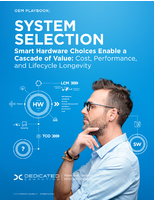Software facilitates sheet metal formability analysis.
Share:
Press Release Summary:
Suited for automotive manufacturers, PAM-STAMP 2G sheet metal forming simulation software package predicts yield behavior under complex stress states. It integrates Corus-Vegter model to optimize accuracy of formability analysis predictions and press stamping evaluations. Corus-Vegter model incorporates understanding of sheet metal behavior during deformation for modern and widely-used materials, including high-strength steels and aluminum.
Original Press Release:
Integration of the Corus-Vegter Model into PAM-STAMP 2G Software Improves Reliability and Cost Benefits
Corus and ESI Group Partnership Provides Advanced Material Simulation Capabilities to Automotive Manufacturers
Paris, London, 9 March 2005 - Corus, the international metals producer, and ESI Group, leading provider of digital simulation software for prototyping and manufacturing processes, today announced the integration of the Corus-Vegter model, a new advanced material simulation model, into PAM-STAMP 2G software package. Combining Corus and ESI Group expertise, this partnership will help automotive designers and engineers to significantly improve the accuracy of formability analysis predictions and press stamping evaluations.
Using computer-aided tools to help reduce the cost and time necessary for new vehicle development and improve manufacturing processes is not new. Formability analysis tools are currently used to predict material behavior to simulate what happens when sheet material is stamped into a three-dimensional part, such as a body panel. However, as carmakers increasingly use advanced high strength steels and aluminium alloys, existing material simulation tools - largely based on data from mild strength steels and featuring relatively simple models - are becoming more and more inadequate for the latest simulation requirements, especially panel quality and tolerance control.
Corus has developed the unique Corus-Vegter model, which incorporates Corus' advanced understanding of sheet metal behavior during deformation in response to the need from the global automotive industry for a model that can accurately predict the behavior of more modern and widely used materials. Over the last two years, Corus has worked closely with ESI Group to implement the Corus-Vegter model in PAM-STAMP 2G, the sheet metal forming simulation software package.
Easy to use, the Vegter model features the latest data, including high strength steels and aluminium. Validated on standard test pieces as well as an actual automotive component, the model allows engineers and designers to predict yield behavior more accurately under complex stress states and improve the performance of stamping operations. Importantly, the Vegter model provides a powerful tool to help manufacturers speed up the proving process, therefore reducing costs of new product development. The ability to more accurately predict behavior will also lead to improved part reliability on new vehicle models.
Commenting on the development of the Vegter model, Dr Frans de Rooij, Product Applications Manager, Corus Strip Products, IJmuiden: "Corus is a company at the forefront of understanding material properties and their applications. The Vegter model is a good example of how we can use this extensive knowledge to provide the automotive industry not only with quality materials, but also the latest technology and tools that help carmakers improve manufacturing processes to build better, stronger and safer cars."
"New material grades present constant challenges to improve final part quality assessment and tolerance control. Through the cooperation with Corus, ESI Group has developed within PAM-STAMP 2G state-of-the-art material technology modelling to meet the demand for high-quality material models," said Dr Fouad El Khaldi, Product Operations Manager, ESI Group.
The Corus-Vegter model has been validated on a full-scale automotive part in collaboration with Renault. Dr Mostafa El Mouatassim, CAE and Stamping Feasibility Team Leader at Renault, said: "Nowadays, digital stamping simulation for new vehicle development is unavoidable, as it allows fast improvement loops for products and processes. This project shows how collaboration between car manufacturers, steel manufacturers and software suppliers can contribute to the continuous improvement of the quality of simulation results."
About ESI Group
ESI Group is a pioneer and world-leading provider of digital simulation software for prototyping and manufacturing processes that take into account the physics of materials. ESI Group has developed an entire suite of coherent, industry oriented applications to realistically simulate a product's behavior during testing, to fine-tune the manufacturing processes in accordance with the desired product performance, and to evaluate the environment's impact on product usage. ESI Group's products, which have a proven track record in manufacturing and have been combined in multi-trade value chains, represent a unique collaborative, virtual engineering solution, known as the Virtual Try-Out Space (VTOS), enabling virtual prototypes to be improved in a continuous manner. By drastically reducing costs and development lead times, VTOS solutions offer major competitive advantages by progressively eliminating the need for physical prototypes. ESI Group is listed on the Nouveau Marché of Euronext Paris, and generated sales of Euros60m in 2004. The company employs almost 500 high-level specialists worldwide, and covers more than 30 countries. For further information, visit www.esi-group.com.
About Corus
Corus Group Plc (LSE/AEX: CS; NYSE: CGA) is one of the world's largest metal producers with an annual turnover of £8 billion and major operating facilities in the U.K., the Netherlands, Germany, France, Norway and Belgium. Corus has 48,500 employees in over 40 countries and sales offices and service centers worldwide. Corus' four divisions comprising Strip Products, Long Products, Distribution & Building Systems and Aluminium provide innovative solutions to the construction, automotive, packaging, mechanical engineering and other markets worldwide. In the automotive industry, Corus works with its customers throughout the vehicle development process to find the most effective lightweight body and component solutions. Corus' expertise is drawn from an intimate knowledge of contemporary vehicle performance requirements, manufacturing-feasible ideas, and material properties.




